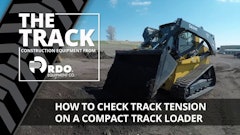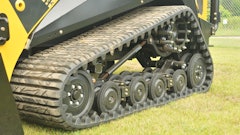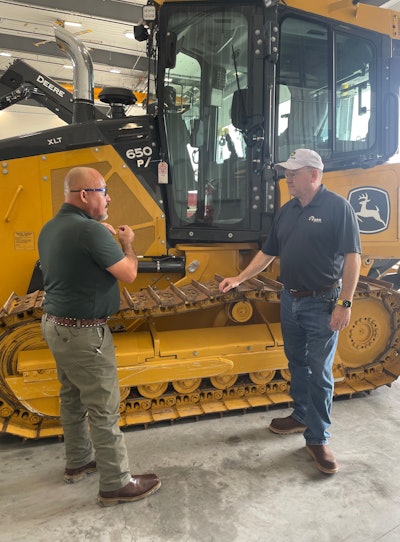
When choosing your equipment, a machine's total cost of ownership (TCO) is a huge consideration. A machine’s TCO is largely related to the tracks and undercarriage and how well these parts are being maintained. The undercarriage can be kept well maintained and confirmed to be in good condition through periodic inspection.
So, who should perform these undercarriage inspections? There are a few options for maintaining your machine’s undercarriage, but one of the easiest is to have your dealer do it. A trusted dealer is a great way to ensure that you get quality information and an inspection done well. Undercarriage inspections can easily be overlooked but are an important part of your machine care regimens.
Planning Dealer Inspections
In many cases, you won’t have to look far to get your machine’s undercarriage inspected. If you ask your dealer to inspect the undercarriage, most should be able to do so.
“Most equipment dealers offer these undercarriage inspections as part of their aftermarket services,” said Joe Olivas, customer service advisor at RDO Equipment Co.
It is important to get the inspection done by a trusted dealer. By doing so, you ensure that you are getting accurate maintenance information and advice. It’s also important to know what your dealer offers.  It is important to consider how frequently you need to keep up with your machine’s maintenance and stick to it.CASE
It is important to consider how frequently you need to keep up with your machine’s maintenance and stick to it.CASE
“All CASE Construction Equipment dealers provide undercarriage inspections. It’s an important pillar of our customer support program worldwide in undercarriage to help our customers manage their equipment and achieve lower cost per hour,” said Tim Hansen, product marketing manager - undercarriage/ground engaging tools at CASE Construction.
Keeping Up
It is important to consider how frequently you need to keep up with your machine’s maintenance and stick to it. It is generally recommended to get an undercarriage inspection done once or twice a year. Depending on the type of environment that the machine is in, inspections and maintenance may have to be more frequent.
“We recommend an undercarriage inspection at least once each year but you might want to do them more often, depending on the age of the machine and a jobsite’s specific environmental factors - like if [the] soil is dense, sandy, or wet,” said Olivas.  If the soil your machine is being exposed to is harsher on the equipment, you will likely need to get it checked more frequently to ensure everything is in working order.RDO Equipment Co.
If the soil your machine is being exposed to is harsher on the equipment, you will likely need to get it checked more frequently to ensure everything is in working order.RDO Equipment Co.
Soil types can vary the maintenance timeframe and necessity. If the soil your machine is being exposed to is harsher on the equipment, you will likely need to get it checked more frequently to ensure everything is in working order.
Olivas continued, “An older machine or an environment that will increase the possibility of wear and tear will require undercarriages to be inspected more frequently.”
It is vital that your machine is being brought in to be inspected consistently and as needed depending on the age and material that it is being exposed to. While professional inspections can be performed a few times a year, there is more attention to be given to your machines.
“Each machine operator should be performing a walk-around inspection before operating the machine to detect any easily identifiable issues,” said Olivas.
Steps to Inspect
It takes more than a glance to perform an undercarriage inspection. There is a list of steps that have to be covered in order to properly complete an inspection. You should know what is covered in an undercarriage inspection so that you know what to expect when it’s time for your machine to get one done.
This is the general outline of what’s included in a typical undercarriage inspection:
- Determine the jobsite environment and its wear impact
- Remove any debris or gunk
- Measure wear
- Examine track/chain tension
- Examine the frame and any of its areas of wear
- Check for any oil leaks
- Listen for unusual sounds
- Document measurements and determine immediate maintenance needs
 There is a list of steps that have to be covered in order to properly complete an inspection.RDO Equipment Co.
There is a list of steps that have to be covered in order to properly complete an inspection.RDO Equipment Co.
Pieces of the Whole
When looking at the health of your machine’s undercarriage, considering the condition of its chains is a huge factor. Chains are extremely important because they are the part of the machine that allows it to move across surfaces. Chains are like the wheels of track machines.
Hansen said, “Chains are very important and costly. They are essentially the rails on which the machine runs.”  When looking at the health of your machine’s undercarriage, considering the condition of its chains is a huge factor.CASE
When looking at the health of your machine’s undercarriage, considering the condition of its chains is a huge factor.CASE
The machine relies on the chains and their condition. This makes keeping your machine’s chains in good condition immensely important. Guaranteeing that your machine gets undercarriage inspections as much as necessary and is examined daily by the operator is vital to the overall function and ability of the machine.
“The chains endure the majority of the stress of dozing, of pushing or pulling. It’s important to keep chains in good shape because once they’re worn, other components will begin taking on a lot more stress and wear,” said Olivas.
The state that chains are in can determine the state of the rest of the machine. If the chains are failing, the entire machine will begin to break down as other aspects begin to take on stress that it isn’t used to.
 Guaranteeing that your machine gets undercarriage inspections as much as necessary and is examined daily by the operator is vital to the overall function and ability of the machine.CASE
Guaranteeing that your machine gets undercarriage inspections as much as necessary and is examined daily by the operator is vital to the overall function and ability of the machine.CASE
Caring for the Undercarriage
One of the best ways you can prolong the life of your undercarriage is to clean your machine regularly. Typically, you will only need to clean the undercarriage as necessary. Cleaning is usually needed when there is some sort of buildup on the undercarriage. This is often related to the jobsite environment.
When soil types like mud or sand are present on the worksite, operators are more likely to need to clean off some buildup.  It is vital that your machine is being brought in to be inspected consistently and as needed depending on the age and material that it is being exposed to.RDO Equipment Co.
It is vital that your machine is being brought in to be inspected consistently and as needed depending on the age and material that it is being exposed to.RDO Equipment Co.
“Operators also need to remove mud, loam, or sand that gets caked in between shoes and chains. When this type of soil dries, it acts as sandpaper, causing premature wear on the undercarriage. It’s best to clean these components daily, especially where the shoes or rollers rub against either,” said Olivas.
Olivas also recommends operators clean their machine’s undercarriage when they move to a different jobsite, as the environment may change from sandy to more rocky and dense.
Taking care to clean the undercarriage will help your machine parts last longer and stay functioning for a lengthier amount of time.
It Pays to Inspect
Undercarriage inspections are important for fleet owners and machine operators but they are also important for contractors. Undercarriage inspections are a great tool for contractors to take advantage of due to the comprehensive level of information given afterward.
Like with any typical condition checks and routine maintenance, contractors can keep track of their equipment and a machine’s undercarriage condition with an undercarriage inspection. In addition to having more information, contractors can use the inspections as a way to keep track of how much to charge a customer for the undercarriage wear that occurred during a project by getting an inspection done at the beginning and the end of the job.
Working with your dealer to get an undercarriage inspection on your machine can also benefit your operators. If you have an inexperienced operator, having an inspection done can be an advantage to your new operator.
Olivas explained that he and his fellow customer service advisors often work alongside recently hired operators so they can show them the ropes and teach them how to measure the width of the shoes and the diameters of the top or bottom rollers.
This is a great way to get operators comfortable with their machines. As the operators get better versed with their machines and the undercarriage, the contractor benefits.
Undercarriage Inspections are Machine Care
While the undercarriage can be easy to forget about, getting undercarriage inspections done is a great way to care for your machine and your team. Even with the undercarriage being under the machine and now nearly as visible as the rest of it, it is a crucial area of the equipment. Don’t let the undercarriage get lost in the background!  After getting an inspection done, you will have an idea of the timeline and length of life left in the undercarriage.CASE
After getting an inspection done, you will have an idea of the timeline and length of life left in the undercarriage.CASE
Hansen said, “Every inspection completed by the dealer is a valuable touch point with the customer and their machines and provides opportunities for further discussion.”
Going in for routine inspections keeps communications open with an invaluable source of equipment and part information. It is always a wise idea to have a professional check out your machine to continue to be aware of things to look out for and stay aware of. Technologies and parts get updated and changed constantly, so it is important to have a reliable source to help keep you current on anything necessary.
Undercarriage inspections are a huge part of machine care. If the undercarriage is not in good condition, the rest of the machine starts to take on more stressors and feel the effects of the undercarriage wearing out. Having a trusted dealer and being able to communicate with them about your machine and the necessary inspection periods will help ensure that the machine is kept in the best condition that it can be. Don’t let your undercarriage inspection get overlooked — contact your trusted dealer today.





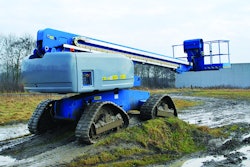
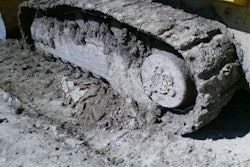
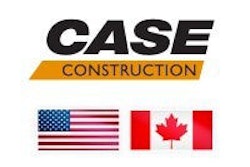

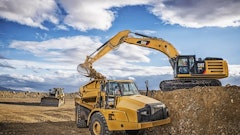

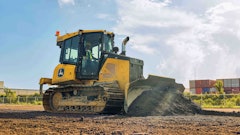

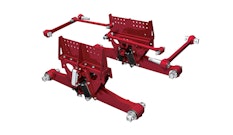
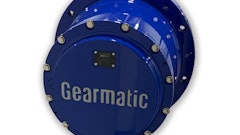
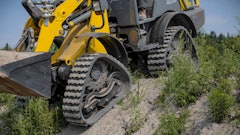
![Jd Anti Vibration Undercarriage System 1[2][2]](https://img.forconstructionpros.com/files/base/acbm/fcp/image/2021/08/JD_Anti_Vibration_Undercarriage_System_1_2__2_.6116b9ff490e9.png?ar=16%3A9&auto=format%2Ccompress&fit=crop&h=135&q=70&rect=9%2C2%2C701%2C395&w=240)
